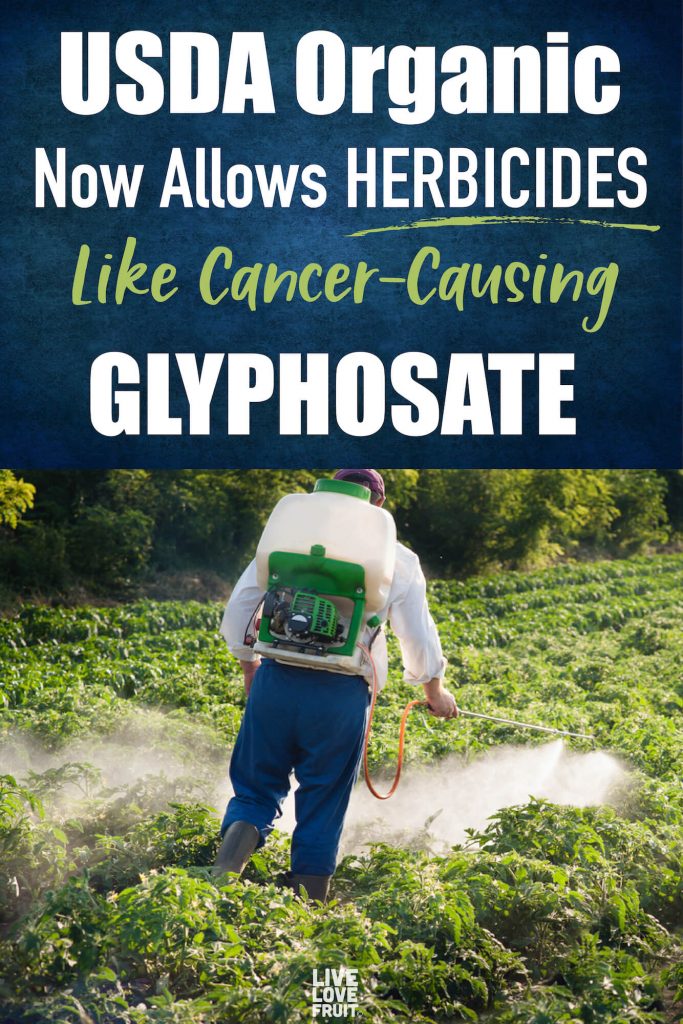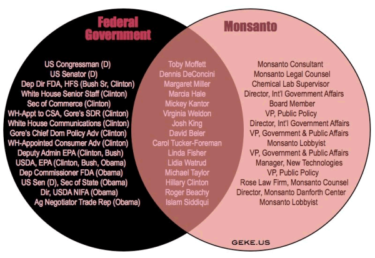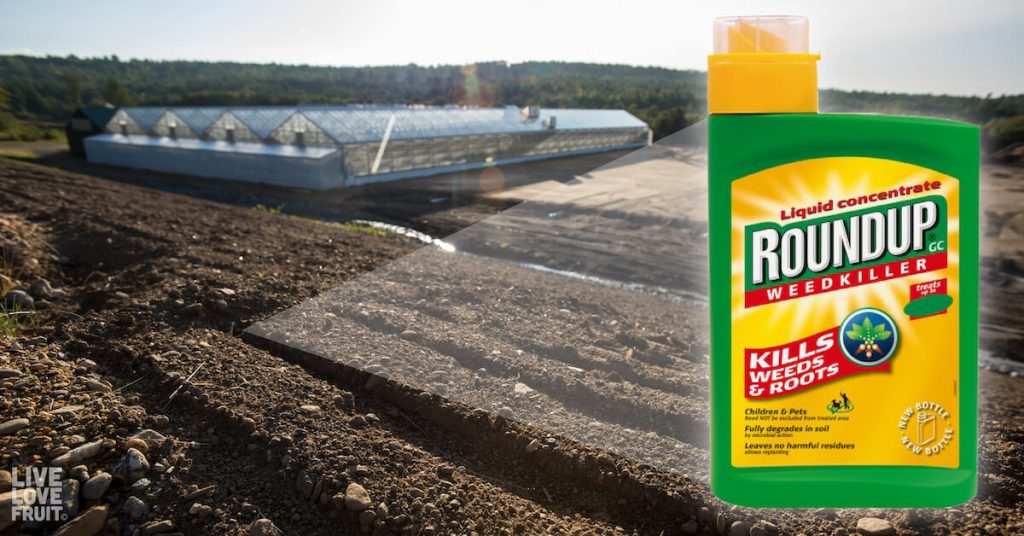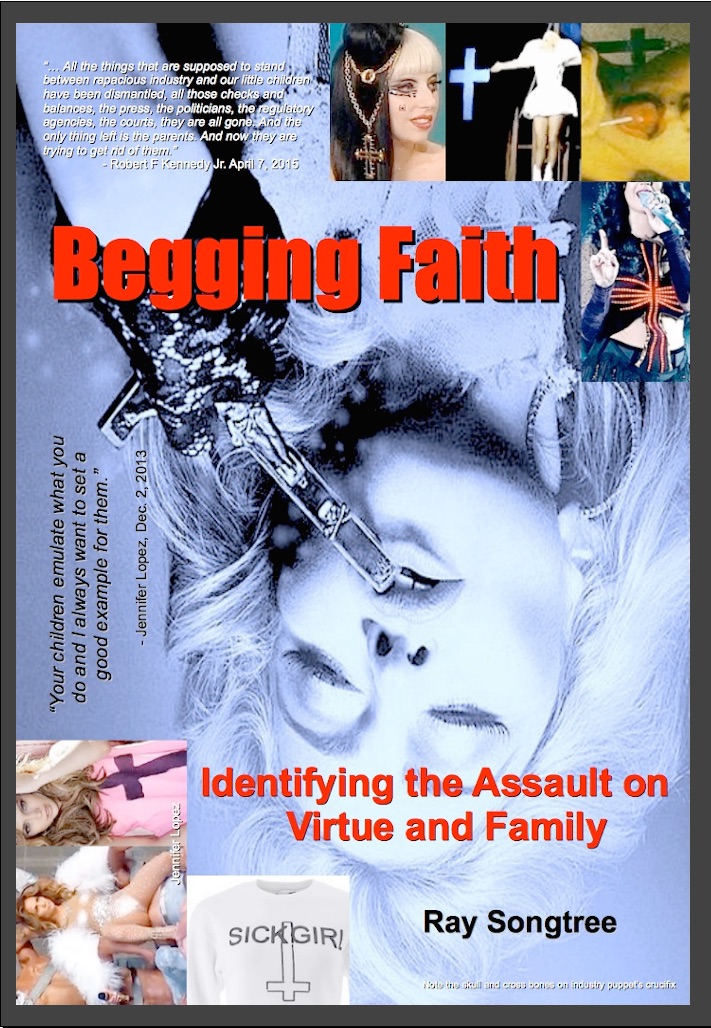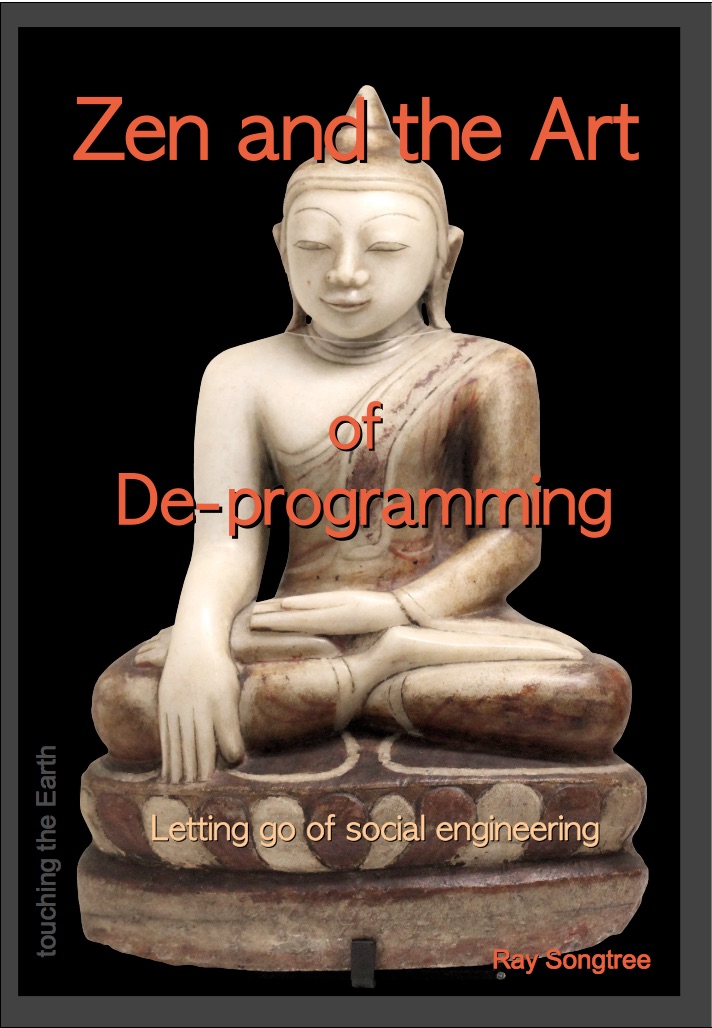Mirror from Natural News which is banned on Facebook for speaking truth to power. Facebook is part of criminal deep state.
Below, May 15, 2019 Editorial piece by Gary Hooser, Kauai. Administrators are culpable.
Followed by April 11, 2019 USDA press release decrying Vietnam’s Banning of Glyphosate – USDA supports biotech directly.
Infogram showing revolving door between Monsanto and Federal Government
And finally April 15, 2019 article that USDA is allowing glyphosate in “organic” hydroponics.
Let us hope that Monsanto’s criminal activity exposes the criminal compliance in government agencies.
BOMBSHELL: Bayer discovers “black ops” division run by Monsanto, shuts it down, initiates internal investigation as law enforcement prepares criminal charges against the chemical giant
Wednesday, May 15, 2019 by: Mike Adams

(Natural News) For over a decade, Monsanto has been engaged in building and maintapining “hit lists” of journalists, lawmakers and regulators to be taken out if they opposed the evil agenda of GMOs and toxic glyphosate weed killer chemicals that now inundate the world food supply. Any influential person who opposed the Monsanto agenda was subjected to one or more of the following:
- Attempted bribery
- Death threats and intimidation
- Character assassination through well-funded “negative P.R.” campaigns
- Defamation via coordinated Wikipedia attacks, run by Monsanto operatives
- Career destruction, such as getting scientists blacklisted from science journals
- Being doxxed, having their home addresses publicized and their families and co-workers threatened
In other words, Monsanto has been running a “black ops” division for over ten years, spending perhaps $100 million or more on efforts to silence, destroy or assassinate anyone who interfered with the agricultural giant’s market dominance.
Now, the criminal mafia activity that Monsanto has carried out for years is finally being exposed as law enforcement closes in on the crimes of this evil agricultural giant now owned by Bayer, a corporation that appears to be making an effort to “clean house” and end the Monsanto crimes that targeted journalists, lawmakers and regulators with intimidation and bribery campaigns.
Law enforcement preparing criminal charges against Monsanto division operatives
“French prosecutors said on Friday they had opened an inquiry after newspaper Le Monde filed a complaint alleging that Monsanto – acquired by Bayer for $63 billion last year – had kept a file of 200 names, including journalists and lawmakers in hopes of influencing positions on pesticides,” reports Reuters.
100% organic essential oil sets now available for your home and personal care, including Rosemary, Oregano, Eucalyptus, Tea Tree, Clary Sage and more, all 100% organic and laboratory tested for safety. A multitude of uses, from stress reduction to topical first aid. See the complete listing here, and help support this news site.
This “hit list” of journalists and lawmakers was directly translated into action to intimidate, threaten or bribe these individuals, just as happens in the United States. In fact, a Monsanto spokesperson now confirms the Monsanto mafia used the list to take out anyone standing in the way of the Monsanto agenda. “There have been a number of cases where – as they would say in football – not the ball was played but the man, or woman, was tackled,” admitted Matthias Berninger to Reuters. Berninger is the “head of public affairs and sustainability” of Monsanto.
Further into the statement, Berninger admits Monsanto collected “non-publicly available data about individuals” and then issued an apology from Bayer for the activity. “Following an initial review, we understand that this initiative has raised concerns and criticism,” said Bayer in a May 12th public statement. “This is not the way Bayer seeks dialogue with society and stakeholders. We apologize for this behavior.”
What Natural News can reveal is that Monsanto hired black ops teams and private investigators to dig up the personal locations of individuals and their families, then engaged in activities to threaten and intimidate those individuals while publicly smearing them online through coordinated, well-funded character assassination campaigns.
This author believes that, over the last decade, I have been personally hunted by Monsanto-funded black ops teams who intended to destroy my credibility and physically harm my person in order to silence my public criticism of Monsanto and end the publishing of MonsantoMafia.com, GMO.news, Glyphosate.news and the dozens of other websites that Monsanto did not want to see published.
See my full video here, which explains more:
Health Ranger: I am willing to share details with Bayer’s investigation team in exchange for a public apology and a retraction of the smears
I am willing to consider the possibility that Bayer is genuine in its attempts to clean up the “Monsanto mafia” mess that it has inherited. It is possible that the culture of Bayer is not nearly as evil and corrupt as the culture of Monsanto, which is why I am willing to sit down with Bayer’s internal investigators and privately detail the illegal tactics that have been used against myself and others who spoke out against the multiple criminal activities carried out by Monsanto’s “black ops” teams.
I will do this in exchange for a public apology from Bayer that specifically names myself, the Food Babe, Jeffrey Smith and other individuals in the independent media (there are about twenty) who have been specifically targeted, smeared and threatened by Monsanto operatives over the years. Bayer may contact my legal team for more details of what we are requesting.
This is a rare opportunity for Bayer to hear directly from the victims of the Monsanto “black ops” division that Bayer likely was not aware it was acquiring when it purchased Monsanto, since the entire division operated in secret and relied on internal corporate money laundering to obfuscate its operations.
Bayer’s attorneys may reach out to Natural News through our public contact page. Our attorneys are also initiating contact with Bayer’s legal team to initiate discussions.
Bayer says it will support criminal indictments of Monsanto operatives
If you read the Bayer announcement that went public on May 12, you’ll find that Bayer is openly supporting the criminal indictment of Monsanto operatives who ran its black ops division. “Bayer will fully support the public prosecutor’s office in France in its investigation,” says the statement.
That same statement also explains:
As an immediate measure, we have decided to suspend our cooperation with the involved external service providers for the time being. The responsible Monsanto manager left the company shortly after the acquisition.
The “external service providers” were, Natural News has learned:
- Negative P.R. firms hired to engage in online character assassination.
- Rogue private investigators tasked with geo-locating targeted individuals.
- “Wet work” intimidation / assassination teams that were directed to threaten violence and / or carry out direct violence against “enemies” of Monsanto, including the targeting of innocent family members.
Bayer goes on to explain, “We are also currently investigating further appropriate consequences both internally and with regard to external parties. Bayer stands for openness and fair dealings with all interest groups. We do not tolerate unethical behavior in our company.”
If true, this would stand in great contrast to Monsanto itself, which was run like a criminal mafia organization, complete with “hit men” and terror campaigns that focused on critics of the biotech company.
Perhaps Bayer is hoping to clean up the Monsanto nightmare and initiate a new era of operations where public debate replaces the intimidation, threats and murder campaigns run by former Monsanto operatives. As someone who has been routinely targeted, threatened and smeared by Monsanto, I am willing to entertain the possibility that Bayer is looking to right past wrongs. Even though I may never agree with the widespread use of herbicides and pharmaceuticals across society, I don’t go out of my way to criticize corporations unless they are engaged in acts of extreme evil.
McDonald’s for example, sells all sorts of garbage food products that are unhealthy for society, but McDonald’s doesn’t hire hit teams to hunt down and try to assassinate critics, for example. McDonald’s just runs ads and tries to get the public to focus on social happiness instead of the chemical pesticides found in their products. And for the most part, it works. Nobody goes to McDonald’s expecting an all-organic diet in the first place. McDonald’s is a “voluntary compromise” where a consumer is obtaining convenience and low cost in exchange for surrendering a bit of their own long-term health. But no one from McDonald’s puts a gun to their head and demands, “EAT HERE OR DIE MUTHA F##KA,” which is essentially the way Monsanto was run for over a decade.
Investigating “the project Monsanto commissioned”
Finally, I want to draw your attention to one more line in the Bayer press release. It refers to “the project Monsanto commissioned” and promises to “evaluate the allegations.”
I can report to you that this “project” is the black ops unit of Monsanto. It was commissioned by angry, evil Monsanto managers whose personal hatred and violence is only exceeded by the violence of the Monsanto corporation itself, which unleashed Agent Orange on the world, along with a long list of other deadly chemicals that were used against innocent civilians as weapons of war.
Monsanto was run by some of the most evil, criminal-minded people in the history of the world. These people, I believe, are directly responsible for acts of extreme violence — both online and offline — that specifically targeted Monsanto critics like myself. They belong behind bars, and it looks like Bayer may actually be willing to help put them there.
It’s time for Bayer to close the chapter on this Monsanto era of disinformation, destruction and death. Otherwise, the anger against Monsanto that is well deserved and widely publicized across the activist community will continue to reflect on Bayer and its share price. Monsanto has committed acts of tremendous evil against innocent, well-meaning individuals who only advocated a cleaner food supply and honest labeling. If Bayer does not open a dialogue with these activists and help resolve some of these issues, Bayer will continue to pay the price for crimes that it inherited through its acquisition of Monsanto, which has already proved disastrous from a financial point of view.
I believe the only way Bayer can resolve this is to talk to those of us who suffered through these malicious attacks and still somehow made it out alive. Bayer needs to publicly apologize, set the record straight, admit the crimes of the Monsanto black ops managers, and retract all the smear articles and Wikipedia entries it funded.
It’s time for Bayer to come clean.
If you are an administrator, public or private, you are liable for the workplace practices that occur under your supervision or authority. Likewise, if you are an employer, public or private, you are responsible for the actions and inactions of your administrators/managers.
If I am talking like a lawyer, it’s because the lawyers are indeed talking. If you are an employer, public or private, it’s probably a good idea that you start listening.
There are now three separate court decisions against Monsanto/Bayer concluding that “RoundUp” (a glyphosate based product), has caused or significantly contributed to the development of cancer (non-Hodgkin’s lymphoma) in the plaintiffs who brought suit.
Three separate judges, three separate juries, three separate sets of circumstances, four different plaintiffs — all yielding the same or similar conclusion.
The most recent decision awarded two plaintiffs over $1 billion apiece. Granted that amount will likely be reduced upon appeal, but even the lowest award in the three cases cited exceeds $78 million.
News reports indicate over 13,000 (and counting) additional plaintiffs have filed similar lawsuits against Monsanto, alleging their products cause non-Hodgkin lymphoma and that the company has hidden the risks.
It’s only a matter of time, until plaintiffs attorneys shift their gaze to large employers that knew or should have known about the danger these chemicals posed to their employees and the public.
One would hope that public/private “risk reduction managers”are taking notice, and taking action. Even if the mayor, the council, legislators and the governor are still living in the dark ages and believe that “there is nothing wrong with RoundUp” and thus are not concerned about worker safety or the public’s health, one would think they would at least worry about the financial exposure.
Faced with a relentless flow of science (and court cases) pointing to the health risks of various toxic herbicides and pesticides used or regulated by their administration, history will show they were proactive and erred on the side of protecting the health of their workers and the public – or that they put the interests of big business and corporate profits first and foremost.
The state of Hawaii and the various counties use large amounts of RoundUp and related products daily for “weed control” along highways AND in our public schools and parks.
How many gallons or pounds of herbicide is used in Hawaii is anyone’s guess because the state does not require the reporting of glyphosate or RoundUp related products. I repeat, the state has no clue how much is used, purchased or sold in Hawaii. This fact alone, to me anyway (and possibly to a jury in the future), demonstrates gross negligence on the state’s part.
The state attorney general and county legal advisers are also no doubt, aware of the three separate court cases and of the 13,000 (and counting) plaintiffs who are waiting for their turn.
If they are fulfilling their fiduciary duty, the state and county legal advisers have informed the governor and the mayor of the existence of the legal issue and potential liability.
Perhaps a legislator or councilmember has requested a formal legal opinion (or not), asking the attorney general to opine as to the state or County liability for failure to protect its workers and the public from the widespread use of these products on public lands and around public facilities (thinks schools, parks, walking paths etc).
If such a legal opinion were provided, I suspect it would show that in light of the recent court developments, it is in the best interest of both the state and the counties to eliminate and/or severely reduce the use of these chemicals.
Action to reduce or eliminate the use of herbicides can be taken by the rank and file managers, their supervisors and department and division heads today without the need for a change in the law. Labor unions can also demand today greater protections for their workers.
Principals, individual teachers and parents can and should engage this conversation and request an elimination of the use of herbicides on school grounds today.
Ultimately our political leaders must take action. But even without their action, the problem can be solved today — but the public must write the letters, make the calls and demand action.
The days of plausible deniability are over.
•••
Gary Hooser formerly served in the state Senate, where he was majority leader. He also served for eight years on the Kauai County Council and was former director of the state Office of Environmental Quality Control. He serves presently in a volunteer capacity as board president of the Hawaii Alliance for Progressive Action (HAPA) and is executive director of the Pono Hawaii Initiative.
Perdue Statement on Vietnam’s Ban on the Importation of Glyphosate
(Washington, D.C., April 11, 2019) – U.S. Secretary of Agriculture Sonny Perdue issued the following statement in response to the announcement by Vietnam’s Ministry of Agriculture and Rural Development (MARD) that Vietnam will ban the importation of glyphosate:
“We are disappointed in Vietnam’s decision to ban glyphosate, a move that will have devastating impacts on global agricultural production. As I’ve often said, if we’re going to feed 10 billion people by 2050, farmers worldwide need all the tools and technologies at our disposal.
“On numerous occasions, USDA has shared scientific studies with MARD from the U.S. Environmental Protection Agency and other internationally recognized regulatory bodies concluding that glyphosate is unlikely to pose a carcinogenic hazard to humans. This ban flies on the face of that scientific evidence. Furthermore, Vietnam has sidestepped its obligation to notify this regulatory change to the World Trade Organization.
“Vietnam also needs to look at the potential ramifications for its own farmers. In addition to the immediate effect of slowing the development of Vietnamese agricultural production, there’s the very real risk that Vietnam’s farmers will turn to unregulated, illegal chemical products in place of glyphosate.”
USDA Organic Now Allows Glyphosate in Organic Hydroponic Food Production
With the massive out-cry for Monsanto to stop poisoning the planet, one would think that the last thing an organic growing operation would do is start adding these products to their food. At least, that would be the logical thing to assume. Unfortunately, this is not the case.
Glyphosate in “Organic” Hydroponic Food Production
The National Organic Program (NOP) recently announced that they are now allowing glyphosate in “organic” hydroponic food production. Using common sense, this would rightfully deem any product non-organic – but this doesn’t seem to be the case for hydroponics.
Now, glyphosate (an incredibly toxic herbicide that is absolutely prohibited on organic farms) is being sprayed on fields prior to constructing hydroponic greenhouses awaiting organic certification. This is done to remove weeds from the greenhouses.
The issue was brought into light by the Real Organic Project, a family farmer-driven organization that is pushing for an add-on label to USDA certified organic to provide more transparency on these farming practices.
In his long e-mail addressing the situation, Dave Chapman, Executive Director of Real Organic Project, explains how faux-ganic produce is being sold to unsuspecting consumers.
“I have been hearing for months that glyphosate is being sprayed on fields about to be certified organic for hydroponic berry production. The way this use of herbicide is incorporated into “organic” certification is to laser level a field, compact it until it is like a parking lot, wait a little while until the weeds (that slows follow disturbed soil) have germinated. And then spray it with an herbicide. They are doing this in California and Florida. The weeds in Florida are fierce, and can grow straight through the black plastic. Weed control in organic blueberry production is the biggest challenge. Being able to spray glyphosate and sell it as organic is an enormous economic advantage.”
Dave Chapman, Executive Director of Real Organic Project
While Chapman and his team posed their concerns to the NOP, they’re not doing a great job of dealing with the “complaint.” Since herbicide-sprayed “organic” produce is faster and cheaper to produce, the grocery store price tag is also cheaper. As a result, real organic farmers who put time and effort into organic weed control are becoming less preferable to customers. After all, who wouldn’t buy a cheaper pack of unsuspecting faux-ganic tomatoes over real organic tomatoes? If the consumer doesn’t spot the difference, then they’re going to go for the cheaper option.
Marie Burcham, an attorney and director of domestic policy for Cornucopia chimed in after news of the inclusion of hydroponics into USDA organic certification. “It’s vital that consumers understand what is happening here…If you see cheap ‘organic’ tomatoes or berries out of season in your area, those are almost certainly hydroponically grown! They are often so cheap, they are putting real organic farmers — farmers who care about the health of the land they farm — out of business.”
Besides the fact that it is obvious that organics cannot and should not be sprayed with glyphosate, the NOP continues to assert that hydroponic, aquaponic, and aeroponic production is allowed (1). NOP argues that because glyphosate does not “touch” the plants being certified, it is technically still “organic.” If that’s not the craziest assumption I’ve heard in regards to organic food production, I don’t know what is. For those of you who don’t know – anything that touches the soil eventually gets taken up by the plant. It becomes apart of the plants tissues and DNA. It is unavoidable.
Herbicides in Hydroponics: Is It Really That Harmful?
We cannot ignore the fact that glyphosate in “organic” hydroponics is making it difficult for real organic farmers to sustain their love of the land in a holistic way.
As Chapman says (2):
“The world is changing, and it is changing fast. Once again, the soil farmers are being pushed out of the market by a tidal wave of cheap product. Once again people will go out of business who are growing exactly what customers WANT to buy. Once again, we lose our choices in the stores. Once again we are misled. Once again the USDA fails us.”
Dave Chapman
Chapman reached out to Jennifer Tucker, the head of the NOP. According to Jennifer, because the plant itself is not being exposed to prohibited substances like glyphosate, spraying the ground with herbicides the week before organic certification is 100% legal. And according to Jennifer, there is no real reason to gather evidence and file a complaint, because of the legality of it all. The opposing party would never win a legal battle, because of the fact that glyphosate isn’t “touching the plant.”
This is all because the USDA does not consider spraying toxic herbicides like glyphosate on the soil immediately prior to inspection to be a disqualifier for organic certification.
According to Chapman, “USDA organic is a voluntary program. It was idealistically created to PROTECT farmers and eaters from fraud. Now it is supposedly the very fraud it was meant to be preventing. And the USDA makes clear they have no intension of changing, regardless of what we, the people, think.”
Aside from the glyphosate allowance, hydroponic producers are also given a blanket exemption from the three-year transition period, which is required for all other organic farmers. This is the time frame where the land must be certified free of prohibited substances, including herbicides like glyphosate.
Hydroponic operations also don’t take into consideration the health of the soil. As the soil becomes compacted and soaked with agrichemicals, the delicate microbiome of the soil is destroyed. The whole point of growing organically is to ensure this planet stays healthy and chemical-free.
People vote with their dollar, so if people are voting on organic hydroponics that aren’t actually organic, the need for more chemical contamination will soon become the norm. This is not how we move forward. Not for the planet, and not for future generations.
What Can Be Done?
Trying to decide whether the organic produce you’re purchasing is actually organic might be difficult, there are some rules you can use to weed them out. Some packages might blatantly state that the organic produce is hydroponically grown, but if it’s not, there are a few other tips you can use.
If there are fresh berries available during a time when they are not seasonal (like in the dead of winter) and they’re labelled organic, and have a lower price tag, they’re probably not actually organic. The same goes for tomatoes and other organic produce that doesn’t normally grow abundantly at certain times of the year. You can find my guide on seasonal buying here.
Growing your own food is also a very viable option, but not accessible to many.
Supporting organizations like The Real Organic Project who is working to create more honest ways for people to find and buy the food they want from farmers they actually want to support is another great option. As mentioned above, they’re currently working on creating an add-on label that will more clearly identify the real organic food that people actually want. I’m excited to see what the future holds for this company, and the add-on label they’re so desperately trying to put into effect.
